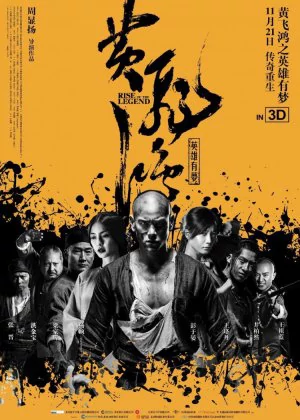Rise of the Legend

Hong Kong's already massive martial arts catalogue is still expanding. Ever since the mid 60s they've been producing martial arts film at an almost constant pace. Sure enough the attention sometimes shifted to other genres, but only for a short period of time. In the end, they always returned to their roots. Point in case: Roy Hin Yeung Chow's Rise of the Legend [Huang Feihong Zhi Yingxiong You Meng], the latest in an endless series of Wong Fei-hung stories.

To be offered the role of Wong Fei-hung is a big deal, as the man is featured in some of the leading Hong Kong martial arts films, portrayed by some of the absolute greats of martial arts cinema. There is Jet Li in Tsui Hark's first Wong Fei-hung film, Gordon Liu popped up in Chia-Liang Liu's Huang Fei-hong Yu Liu a Cai and Wu Guan and Jackie Chan appeared as Fei-hung in the Drunken Master films. It's safe to say that relative newcomer Eddie Peng is in pretty good company.
Even though Wong Fei-hung existed as a real person, the stories around his persona rarely correspond to actual historic events. If you took all the series and films about him and tried to map them chronologically, you'd probably need 6 lifetimes to fit in all his adventures. Rise of the Legend is the latest in a long lineage of Wong Fei-hung stories that probably isn't too concerned with what actually happened. But as any self-conscious martial arts fan will tell you, that isn't too big of a problem. Martial arts is all about legends and folklore, reality doesn't play a big part in that.
Chow's film is a little different from its predecessors in the sense that the story is more detailed. While there's still plenty of fighting, there's also an actual plot that takes up most of the middle part of the film. Fei-hung is infiltrating the Black Tiger gang in order to destroy it from the inside out. To get to the master of the gang Fei-hung has to defeat his adopted sons first, which he does by setting up some elaborate traps. All the while Fei-hung is helped by a couple of lifelong friends who operate from the outside.

Rise of the Legend is not a cheap-looking film. At all. Clearly a lot of money went into the production design and it shows. The costumes, the city and the interiors all look lush and detailed. But it's not the first Chinese film to spend a lot of money on remodeling times long gone. What sets it apart is the reinvention of Hong Kong action cinematography. The classic camera moves are still there, but some creative zooming, first person action shots and snappy editing make for a different action experience. It looks amazing and it gives the genre a welcome boost.
Soundtrack-wise there's not much to look forward to. It's a fair, adrenaline-inducing collection of tracks that go well with the action scenes, but nothing that will stick to your brain or can even be vaguely remembered afterwards. A very typical soundtrack for a martial arts film in other words. It's remarkable how little innovation there is in that regard, especially if you consider the effect a more fine-tuned soundtrack could have on these kind of fight sequences.
Star of the film is Eddie Peng, who is clearly soliciting to become Jet Li's successor. Peng is a bit slicker (he looks more media-aware too, even playing a classical character like Wong Fei-hung), but his fighting skills and posture are top notch and he really shines during the fight sequences. The secondary cast is on par, with a sizable part for Sammo Hung and solid supporting roles for Tony Leung Ka Fai and Angelababy.

Even though Rise of the Legend pays ample homage to the roots of the genre, it also feels like a new start for Hong Kong martial arts cinema. Together with Once upon a Time in Shanghai it heralds a profitable future for Hong Kong's most prestigious genre of films. There are subtle influences from other genres to liven things up, a new batch of actors ready to star as the classic folk heroes and an updated action cinematography that breathes new life into Hong Kong's special brand of action cinema.
Hopefully Rise of the Legend is only the first in a series of new Wong Fei-hung films, as the end left me begging for more. Chow laid the foundations for a new film series and as it has done pretty well for itself I'm sure that a sequel is already in the works. If you're a martial arts fan then this new Wong Fei-hung film is a must-see. It's hard to predict if you'll end up liking the changes that have been made to bring the genre up to speed, but even then there's still plenty of oldskool entertainment to be had from this one.